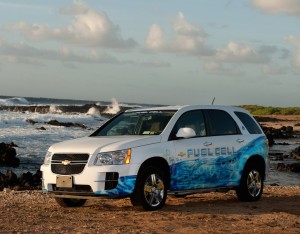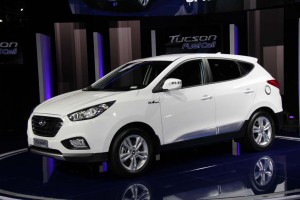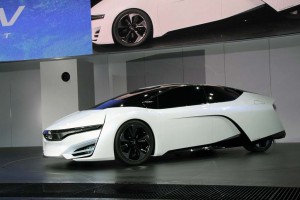While California is generally seen as the land of “green” experiments, the state is putting its money where its mouth is with the installation of dozens of new hydrogen fueling stations across the state.
The California Energy Commission is investing $46.6 million to accelerate the development of hydrogen fueling stations. The cash infusion will add 28 new stations to the existing nine stations. There are another 17 sites in various stages of development, which would bring the total stations expected online in the next couple of years to 54. That commission’s goal is 100 stations.
The debate over the viability of hydrogen-powered vehicles typically has been a chicken-or-the-egg style debate. Automakers have not pushed the development of the vehicles because there is no infrastructure in place to refuel the vehicles. Of course, the hydrogen fuel providers have countered they don’t want to invest in pricey new stations when there aren’t vehicles using them.

GM's fleet of hydrogen-powered Chevrolet Equinox Fuel Cell vehicles, launched in 2007 as part of Project Driveway, have accumulated more than 3 million hydrogen-powered miles.
With the aforementioned stations and several new offerings from automakers, it would seem both sides are moving off their positions. While Honda’s FCV has been rolling around the streets of southern California for more than five years now, it’s getting some company.
At the L.A. Auto Show last November Hyundai said it wants to begin limited sales of a fuel cell-powered Tucson crossover. To increase demand, it announced plans to lease the vehicle for a flat $499 a month, which includes all the hydrogen a motorist might need.
Toyota is also planning to offer its FCV in 2015. The maker is promising the price for the FCV will be between $50,000 and $100,000 with the lower end of the range being the target.
Honda jumped in to the fray late last year as well, with the unveiling of its FCEV fuel-cell vehicle concept car – the maker promising to put a final version into production by 2015.
General Motors has been testing a fleet of 119 fuel cell Chevrolet Equinox crossovers in California. The fleet has more than 3 million miles of hydrogen-powered driving, according to the automaker.
(Hyundai hopes to fire up hydrogen car market. For more, Click Here.)
“Hydrogen fuel cell technology is an important part of GM’s advanced propulsion portfolio and we continue to make substantial progress in furthering this technology,” says Charlie Freese, executive director of GM’s global fuel cell engineering activities, in a statement. “These vehicles have operated through seven full winters and a wide range of environmental conditions, proving that fuel cells can meet the demands of real-world drivers.”
(Click Here to see Honda’s plans for fuel cell vehicles.)
Last year, GM announced two fuel cell-related collaborations. Last July, GM and Honda announced a long-term collaboration to co-develop next-generation fuel cell and hydrogen storage systems, aiming for potential commercialization in the 2020 time frame.
(To see more about Toyota’s FCV coming to the U.S. in 2015, Click Here.)
The companies are also working together with stakeholders to further advance refueling infrastructure, which is critical for the long-term viability and consumer acceptance of fuel cell vehicles.
Also last year GM opened a new state-of-the-art Fuel Cell Development Laboratory at GM Powertrain World Headquarters in Pontiac, Michigan. Last September, GM and the U.S. Army Tank Automotive Research, Development & Engineering Center (TARDEC) jointly announced an expansion of their relationship for testing automotive fuel cell technology.


